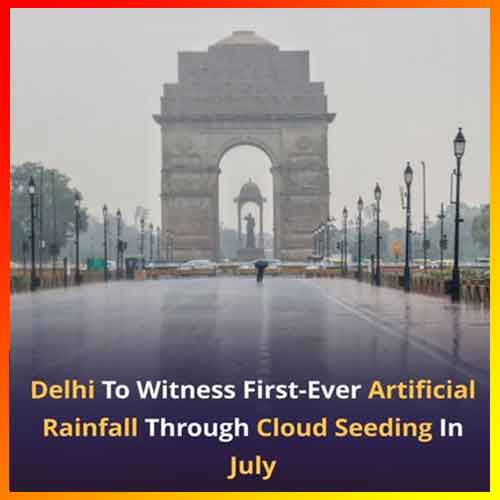
Delhi Environment Minister Manjinder Singh Sirsa announced that five cloud seeding sorties are planned between July 4 and 11, subject to approval, with aircraft covering 100 square kilometres in outer Delhi under a pilot pollution-mitigation project led by IIT Kanpur
In a pioneering step towards tackling hazardous air quality, Delhi is preparing to conduct its first artificial rain through cloud seeding operations, aimed at reducing pollution levels across the capital. The project marks a significant milestone in India’s fight against urban air pollution and will be executed under the supervision of the Indian Institute of Technology (IIT) Kanpur.
Delhi Environment Minister Manjinder Singh Sirsa confirmed that the flight plan for the initiative has been submitted to the India Meteorological Department (IMD) in Pune for technical coordination. Subject to clearances, the cloud seeding sorties are expected to take place in the window between July 4 and July 11.
"Weather conditions are expected to be conducive after July 3. We’ve proposed a window and are awaiting final approvals," said Sirsa, adding that a formal request has also been made to the Directorate General of Civil Aviation (DGCA) for airspace clearance.
Emphasising the government’s intent, Sirsa said, “Clean air is a fundamental right of every Delhiite, and we are exploring all possible solutions. Artificial rain is a bold but necessary step towards meaningful change.”
Trial initiative aims to cut pollution
The upcoming operation, part of a pilot project titled ‘Technology Demonstration and Evaluation of Cloud Seeding as an Alternative for Delhi NCR Pollution Mitigation’, will consist of five sorties, each lasting approximately 90 minutes. The aircraft will cover around 100 square kilometres across low-security airspace in northwest and outer Delhi.
For the task, a specially modified Cessna aircraft will be deployed, equipped with flare-based systems to disperse a proprietary mixture developed by IIT Kanpur. This formulation—comprising silver iodide nanoparticles, iodised salt, and rock salt—is designed to accelerate droplet formation in moisture-laden clouds, triggering rainfall that can wash pollutants from the atmosphere.
The announcement has also stirred political exchanges. Responding to opposition remarks, Sirsa noted that his government had signed the MoU with IIT Kanpur, initiated funding, and completed procedural requirements within four months of assuming office. “While others talked, we acted. Now we’re finalising the date for Delhi’s first artificial rain,” he stated.
If successful, the project could serve as a model for other Indian cities grappling with severe air pollution, providing a scientific intervention to complement long-term environmental policy reforms.
See What’s Next in Tech With the Fast Forward Newsletter
Tweets From @varindiamag
Nothing to see here - yet
When they Tweet, their Tweets will show up here.




























